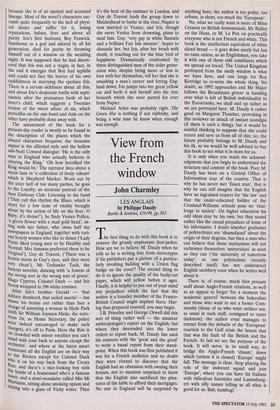View from the French window
John Charmley
LES ANGLAIS by Philippe Daudy
Barrie & Jenkins, f16.99, pp.303
The first thing to do with this book is to remove the grossly unpleasant dust-jacket. How are we to believe M. Daudy when he tells us he is writing free from stereotypes if his publishers put a picture of a particu- larly revolting bulldog with a Union flag badge on the cover? The second thing to do is to ignore the quality of the badly-cut paper, which will yellow before it ages. Finally, it is helpful to put out of your mind any prejudices which the fact that the author is a founder member of the Franco- British Council might implant there. Hav- ing thus prepared yourself, you may begin. J.B. Priestley and George Orwell did this sort of thing rather well — the amateur anthropologist's report on the English; but where they descended into the lower orders to report back, M. Daudy has used his contacts with the 'great and the good' to write a banal report from their stand- point. When this book was first published it was for a French audience and no doubt they were riveted to discover that the English had an obsession with owning their houses, not to mention surprised to learn that the English also sacrificed the plea- sures of the table to afford their mortgages. No one in England will be surprised by anything here; the author is too polite, too urbane, in short, too much the 'European'.
No, what we really want is more of Mme Cresson on British homosexuals, Mr Ridley on the Huns, or M. Le Pen on practically everyone who is not French and white. This book is the intellectual equivalent of white sliced bread — it goes down nicely but has no taste unless, as an Englishman, you take it with one of those odd comfitures which we spread on bread. The United Kingdom portrayed from the study window is what we have here, and one longs for Roy Kerridge to re-write the whole thing. No doubt, as 1992 approaches and Mr Major follows the Broadstairs grocer in handing over what is left of British individuality to the Eurocranks, we shall end up rather as we are portrayed here. M. Daudy is rather good on Margaret Thatcher, provoking in this reviewer an attack of instant nostalgia (if there is such a thing), but it would be wishful thinking to suppose that she could return and save us from all of this; no, the future probably belongs to M. Daudy and his ilk, so we would be well advised to buy this book to see what is in store for us.
It is only when you reach the acknowl- edgments that you begin to understand the structure and content of the book. Poor M. Daudy has been on a Central Office of Information tour of the country. That is why he has never met 'Essex man', that is why he can still imagine that the English have an ingrained respect for 'the law' and that the under-educated fodder of the Crosland-Williams schools pose no 'chal- lenge to society'. On higher education his odd ideas may be his own, but they sound rather like the casual prejudices of some of his informants. I doubt whether graduates of polytechnics are 'shamefaced' about the origin of their degrees, but then a man who can believe that those institutions will not rechristen themselves 'universities' as soon as they can (`the university of tomorrow today', as one polytechnic recently described itself) has not understood English snobbery even when he writes well about it.
There is, of course, much bien pensant stuff about Anglo-French relations, as well as an appeal to forget 'for a moment the academic quarrel' between the federalists and those who want to see a looser Com- munity (those of us who want neither are, as usual in such stuff, consigned to outer darkness); the author even manages to extract from the debacle of the 'European' reaction to the Gulf crisis the lesson that that was the fault of the British and the French. At last we see the purpose of the book. It will serve, in its small way, to bridge the Anglo-French 'chasm', down which (unless it is closed) 'Europe' might fall. The message is clear. Stop playing the role of the awkward squad and join `Europe', where you can have fat Italians with ridiculous hairstyles and Luxemburg- ers with silly names telling us all what is good for us. Bah, humbug!


















































 Previous page
Previous page